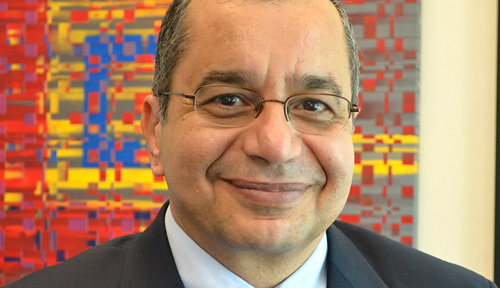UNMC’s public health students will learn how to conduct cancer research in underserved populations around the country and the world in a unique program starting next year.
Recruitment for the Cancer Epidemiology of Education in Specific Populations program is now under way and classes will begin in January. The program comes to UNMC with the newly appointed interim chairman and associate professor of epidemiology Amr Soliman, M.D., Ph.D.
Funded by a $1.2 million grant from the National Cancer Institute (NCI), the two-year program was transferred in September from the University of Michigan School of Public Health, Ann Arbor — one of the leading schools of public health in the United States.
It is the first training grant from the NCI to the UNMC College of Public Health, said Dean Ayman El-Mohandes, M.D., M.B.B.Ch.,
M.P.H. “This program is one of a few in the world that trains public health students in cancer research in special populations domestically and globally,” he said. “This is a tremendous plus for UNMC.”
Before Dr. Soliman was recruited to UNMC this year, he was an associate professor of epidemiology at Michigan, where he founded the program in 2006 and was its director. The grant was renewed last year for five years.
It started when he saw a need for qualified researchers in this field.
“Most international researchers fail because they don’t have the education, experience and the cultural sensitivity necessary to conduct studies in foreign countries. It’s necessary for all aspects — from questionnaire design to intervention development,” Dr. Soliman said.
During the first year, students take classes and work with a mentor in a four-month summer field internship. In the second year, students analyze the collected data, write and publish papers and present findings.
Studies focus on the collection of raw data — cancer incidence, environmental and occupational exposures, types of vaccines available, barriers to screening, outcomes to survival and cancer survival and control.
Students select from seven domestic and 13 international research sites, mostly in Africa and the Middle East, on how to conduct research and design prevention and screening methods in a culturally sensitive manner. Students will be based at universities or with the country’s ministry of health.
While inflammatory breast cancer is rare in the United States, it is common in the North African countries of Morocco, Egypt and Tunisia, where the survival rate is poor, Dr. Soliman said. Colorectal cancer and lymphomas are common in the Sub-Saharan countries of Ghana, Kenya, Tanzania, Uganda and Malawi.
In the six years of the program, 62 students have graduated; 55 percent of them are employed in the field. “Some work for the NCI, some are faculty and some do research in the jungles of Africa,” Dr. Soliman said.
Each year, eight masters of public health and two doctorate students will be accepted into the program. They will receive a stipend that pays for travel and living expenses at the research site and travel to conferences.
“It’s not easy to recruit public health students into cancer research,” Dr. Soliman said. “Most students don’t know about it.”
